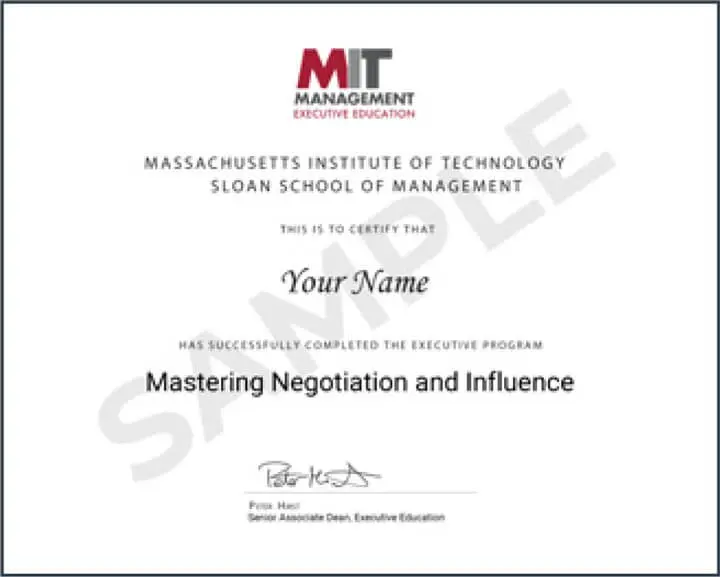
Mastering Negotiation and Influence
Learn How to Influence Others to Change the World
MIT aims to produce principled, innovative leaders who improve the world. To make a difference, you must first be able to influence people. By understanding how to negotiate effectively, you can gain a competitive advantage, achieve business objectives, and effect change.
In Mastering Negotiation and Influence, you will learn negotiation strategies to understand, plan, and achieve your objectives in a variety of contexts. What separates this program from others is the fact that you will engage in real-time negotiations and receive feedback in real time. Beyond learning the frameworks and skills associated with negotiating, you will practice putting these new skills into action.
Program Experience

83 Video Lectures

12 Discussions

9 Live Negotiation Simulations

1 Negotiator's Dealbook

2 Peer Review / Discussions
Program Modules
Using the live negotiations simulation platform, you will experience conflict, identify your own negotiation style, and dive into the basics of negotiation.
As you practice negotiating on price, you will gain an understanding of focal points, ZOPA, BATNAs, reservation price, common errors and three kinds of “no.”
Discovering research into the science of persuasion, you will develop confidence in the principles of influence, anchoring, and value claiming.
Explore methods for negotiating across cultures and genders, the ethical implications in negotiating, and ways to bring empathy and assertiveness to the bargaining table.
Learn to identify the differences between distributive, compatible, and integrative issues as you conduct employment negotiations.
Evaluate the four drivers of subjective value and learn to strike a balance between claiming objective value and building subjective value.
Identify techniques for managing the negotiator’s dilemma, analyze your own personality traits, target the best negotiation approach, and prepare for negotiations using the Seven Elements Framework.
Evaluate psychological barriers in negotiations, your own susceptibility to biases, and strategies to turn barriers to your advantage. Identify strategies for a multi-party negotiation, focusing in part on the rationale of a neutral arbitrator.
Conduct a multi-party negotiation and map the power differences of each party, recognizing barriers related to fairness, power differences, and the medium of communication.
Compare the results of the iMotions Affectiva report against your own perceptions of how you show affect, identifying difficult tactics and developing countermeasures.
This program includes 8-10 practice hours involving live partner simulations
Faculty

Associate Professor, Work and Organization Studies
Jared Curhan is an Associate Professor of Organization Studies at the MIT Sloan School of Management.
Curhan specializes in the psychology of negotiation and conflict resolut...
Participant Testimonials




Certificate
Receive a verified digital certificate of completion from MIT Sloan School of Management. This program also counts towards an MIT Sloan Executive Certificate.
After successful completion of the program, your verified digital certificate will be emailed to you, at no additional cost, in the name you used when registering for the program. All certificate images are for illustrative purposes only and may be subject to change at the discretion of MIT Sloan.
FAQs
How do I know if this program is right for me?
After reviewing the information on the program landing page, we recommend you submit the short form above to gain access to the program brochure, which includes more in-depth information. If you still have questions on whether this program is a good fit for you, please email learner.success@emeritus.org, and a dedicated program advisor will follow-up with you very shortly.
Are there any prerequisites for this program?
Some programs do have prerequisites, particularly the more technical ones. This information will be noted on the program landing page, as well as in the program brochure. If you are uncertain about program prerequisites and your capabilities, please email us at the ID mentioned above. Note that, unless otherwise stated on the program web page, all programs are taught in English and proficiency in English is required.
What is the typical class profile?
More than 50 percent of our participants are from outside the United States. Class profiles vary from one cohort to the next, but, generally, our online certificates draw a highly diverse audience in terms of professional experience, industry, and geography — leading to a very rich peer learning and networking experience.
What other dates will this program be offered in the future?
Check back to this program web page or email us to inquire if future program dates or the timeline for future offerings have been confirmed yet.
How much time is required each week?
Each program includes an estimated learner effort per week. This is referenced at the top of the program landing page under the Duration section, as well as in the program brochure, which you can obtain by submitting the short form at the top of this web page.
How will my time be spent?
We have designed this program to fit into your current working life as efficiently as possible. Time will be spent among a variety of activities including:
Engaging with recorded video lectures from faculty
Attending webinars and office hours, as per the specific program schedule
Reading or engaging with examples of core topics
Completing knowledge checks/quizzes and required activities
Engaging in moderated discussion groups with your peers
Completing your final project, if required
The program is designed to be highly interactive while also allowing time for self-reflection and to demonstrate an understanding of the core topics through various active learning exercises. Please email us if you need further clarification on program activities.
What is it like to learn online with the learning collaborator, Emeritus?
More than 300,000 learners across 200 countries have chosen to advance their skills with Emeritus and its educational learning partners. In fact, 90 percent of the respondents of a recent survey across all our programs said that their learning outcomes were met or exceeded.
All the contents of the course would be made available to students at the commencement of the course. However, to ensure the program delivers the desired learning outcomes the students may appoint Emeritus to manage the delivery of the program in a cohort-based manner the cost of which is already included in the overall course fee of the course.
A dedicated program support team is available 24/5 (Monday to Friday) to answer questions about the learning platform, technical issues, or anything else that may affect your learning experience.
How do I interact with other program participants?
Peer learning adds substantially to the overall learning experience and is an important part of the program. You can connect and communicate with other participants through our learning platform.
What are the requirements to earn the certificate?
Each program includes an estimated learner effort per week, so you can gauge what will be required before you enroll. This is referenced at the top of the program landing page under the Duration section, as well as in the program brochure, which you can obtain by submitting the short form at the top of this web page. All programs are designed to fit into your working life.
This program is scored as a pass or no-pass; participants must complete the required activities to pass and obtain the certificate of completion. Some programs include a final project submission or other assignments to obtain passing status. This information will be noted in the program brochure. Please email us if you need further clarification on any specific program requirements.
What type of certificate will I receive?
Upon successful completion of the program, you will receive a smart digital certificate. The smart digital certificate can be shared with friends, family, schools, or potential employers. You can use it on your cover letter, resume, and/or display it on your LinkedIn profile.
The digital certificate will be sent approximately two weeks after the program, once grading is complete.
Can I get the hard copy of the certificate?
No, only verified digital certificates will be issued upon successful completion. This allows you to share your credentials on social platforms such as LinkedIn, Facebook, and Twitter.
Do I receive alumni status after completing this program?
No, there is no alumni status granted for this program. In some cases, there are credits that count toward a higher level of certification. This information will be clearly noted in the program brochure.
How long will I have access to the learning materials?
You will have access to the online learning platform and all the videos and program materials for 24 months following the program start date. Access to the learning platform is restricted to registered participants per the terms of agreement.
What equipment or technical requirements are there for this program?
Participants will need the latest version of their preferred browser to access the learning platform. In addition, Microsoft Office and a PDF viewer are required to access documents, spreadsheets, presentations, PDF files, and transcripts.
Do I need to be online to access the program content?
Yes, the learning platform is accessed via the internet, and video content is not available for download. However, you can download files of video transcripts, assignment templates, readings, etc. For maximum flexibility, you can access program content from a desktop, laptop, tablet, or mobile device.
Video lectures must be streamed via the internet, and any livestream webinars and office hours will require an internet connection. However, these sessions are always recorded, so you may view them later.
Can I still register if the registration deadline has passed?
Yes, you can register up until seven days past the published start date of the program without missing any of the core program material or learnings.
What is the program fee, and what forms of payment do you accept?
The program fee is noted at the top of this program web page and usually referenced in the program brochure as well.
Flexible payment options are available (see details below as well as at the top of this program web page next to FEE ).
Tuition assistance is available for participants who qualify. Please email learner.success@emeritus.org.
What if I don’t have a credit card? Is there another method of payment accepted?
Yes, you can do the bank remittance in the program currency via wire transfer or debit card. Please contact your program advisor, or email us for details.
I was not able to use the discount code provided. Can you help?
Yes! Please email us with the details of the program you are interested in, and we will assist you.
How can I obtain an invoice for payment?
Please email us your invoicing requirements and the specific program you’re interested in enrolling in.
Is there an option to make flexible payments for this program?
Yes, the flexible payment option allows a participant to pay the program fee in installments. This option is made available on the payment page and should be selected before submitting the payment.
How can I obtain a W9 form?
Please connect with us via email for assistance.
Who will be collecting the payment for the program?
Emeritus collects all program payments, provides learner enrollment and program support, and manages learning platform services.
Are there any restrictions on the types of funding that can be used to pay for the program?
Program fees for Emeritus programs with MIT Sloan Executive Education may not be paid for with (a) funds from the GI Bill, the Post-9/11 Educational Assistance Act of 2008, or similar types of military education funding benefits or (b) Title IV financial aid funds.
What is the program refund and deferral policy?
For the program refund and deferral policy, please click the link here.
Didn't find what you were looking for? Write to us at learner.success@emeritus.org or Schedule a call with one of our Program Advisors or call us at +1 401 264 8575 (US) / +44 150 730 4811 (UK) / +65 3138 5193 (SG)
Flexible payment options available.
Starts On
